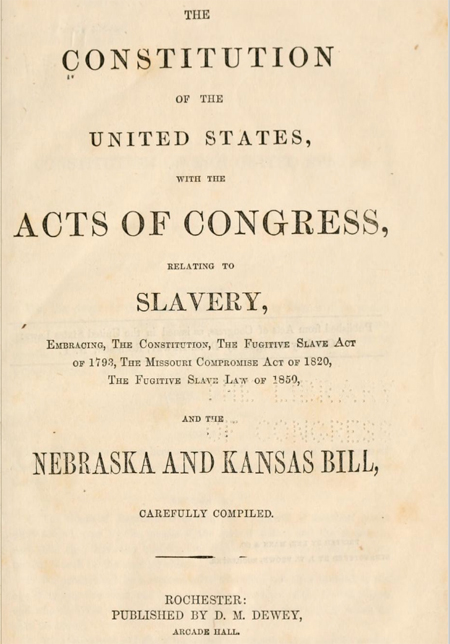Timely Connections: Slavery & Compromise
In a Fox News interview with White House chief of staff John Kelly on Oct. 30, 2017, the former marine general said that “the lack of an ability to compromise led to the Civil War”. Kelly’s statement set off a firestorm of impassioned responses across traditional and social media about the cause of the Civil War and the history of slavery and compromise prior to this seminal event. Read some of the contemporary articles, review background information about compromises over slavery prior to the Civil War, then dive into primary sources to put the pieces of the story together for yourself. What new understandings of history and of today do you come away with? What civic actions might these understandings prompt you to take?
Articles
- John Kelly Pins Civil War on a ‘Lack of Ability to Compromise’ The New York Times Oct. 31, 2017 article reports on responses from Twitter
- Slavery Thrived on Compromise, John Kelly The New York Times Oct. 31, 2017 Op-Ed
- More news articles and opinion pieces from a variety of news outlets compiled by educator Larry Ferlazzo
- Why Are So Many People Angry about History? History News Network 11-2-17
Background
- Timeline of Compromises over Slavery American Social History Project/Center for Media and Learning, City University of New York
- The Constitution
- Fugitive Slave Act (1793)
- Missouri Compromise (1820 & 1821)
- “Gag rule” in Congress (1831-1844)
- Compromise of 1850
- Kansas-Nebraska Act (1854)
- Crittenden Compromise (1860)
Primary sources
- James Madison Memorandum on a African Colony for Freed Slaves ca. October 20, 1789
- James Madison correspondence related to slavery
- The Spread of Slavery 1790-1860 census data visualization interactive map
- Speech of Mr. Van Dyke, on the amendment offered to a bill for the admission of Missouri into the Union, prescribing the restriction of slavery as an irrevocable principle of the state constitution 1820
- More Missouri compromise primary sources & background
- Abolition frowned down gag rule political cartoon c. 1838-39
- Speech of Hon. John P. Hale, upon the slavery resolution, in the House of representatives Thursday, June 25th, 1846
- A defence for fugitive slaves, against the acts of Congress of February 12, 1793, and September 18, 1850 broadside 1850
- Fugitive slave law of 1850 primary sources & teaching resources
- Compromise of 1850 background, speeches, newspaper articles & more primary sources
- Kansas-Nebraska Act primary sources
- The Constitution of the United States, with the acts of Congress, relating to slavery, embracing, the Constitution, the Fugitive Slave Act of 1793, the Missouri Compromise Act of 1820, the Fugitive Slave Law of 1850, and the Nebraska and Kansas Bill 1854
- The Constitution a pro-slavery compact; or, Extracts from the Madison papers, etc. selected by Wendell Phillips third edition, 1856
- Joint resolution proposing certain amendments to the constitution of the United States. The following proposed amendments to the constitution of the United States are based on the Missouri Compromise (Crittenden proposition) 1860
- Letter to Hon. J. J. Crittenden New York, February 22, 1861
- Crittenden Compromise political cartoons 1860-61
- Abraham Lincoln [letter] to Horace Greeley, Friday, August 22, 1862 (Clipping from Aug. 23, 1862 Daily National Intelligencer, Washington, D.C.) discussing slavery and the preservation of the Union
Related resources
- Chronicling America
- Finding Resources: Accessing Contemporary Articles
- Civil War primary sources & teaching resources
- More Timely Connections posts
Please use the Comments section to add thoughts, ideas, and links to additional articles you are reading and primary sources your are analyzing.

